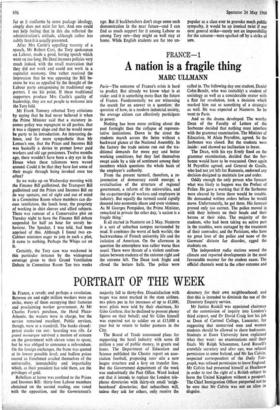A nation is a fragile thing
FRANCE -1 MARC ULLMANN
Paris—The outcome of France's crisis is hard to predict. But already we know what is at stake: and it is something more than the future of France. Fundamentally we are witnessing the search for an answer to a question: the question of how, in a modern industrial society, the average citizen can effectively participate in power.
Nothing has been more striking about the past fortnight than the collapse of represen- tative institutions. Down in the street the students march across the Seine without a backward glance at the National Assembly. In the factory the trade unions run out the tra- ditional demands for more pay and better working conditions, but they feel themselves swept aside by a tide of sentiment among their members which questions the whole basis of the employer's authority.
From the present turmoil, therefore, a re- juvenation of democracy could emerge; a revitalisation of the structure of regional government, a reform of the universities, and the co-partnership of workers and employers in industry. But equally the turmoil could rapidly descend into economic chaos and even violence. As M Georges Pompidou, the Prime Minister, remarked in private the other day, 'a nation is a fragile thing.'
It all started in Nanterre on 2 May. Nanterre is a sort of suburban campus surrounded by mud. It combines the worst of both worlds; the backwardness of French university life and the isolation of American. On the afternoon in question the atmosphere was rather worse than usual. There were threats of a violent confron- tation between students of the extreme right and the extreme left. The Dean took fright and closed the lecture halls. The police were called in. The following day one student, Daniel Cohn-Bendit, who was (suitably) a student of sociology as well as a considerable orator with a flair for revolution, took a decision which marked him out as something of a strategist as well. He was expected at Nanterre. So he went to Paris.
And so the drama developed. The worthy Dean of the Faculty of Letters of the Sorbonne decided that nothing must interfere with the grammar examination. The Minister of Education, M Main Peyrefitte, agreed. So the Sorbonne was closed. But the students were inside: and showed no inclination to leave.
The Dean, with his eye firmly fixed on the grammar examination, decided that the Sor- bonne would have to be evacuated. Once again M Peyrefitte agreed; and General de Gaulle, who had not yet left for Rumania, endorsed any decision designed to maintain law and order.
Oddly enough the only person who foresaw what was likely to happen was the Prefect of Police. He gave a warning that if the Sorbonne were cleared by force there would be trouble. He demanded written orders before he would move. Unfortunately, he got them. His forecast proved only too correct. The police moved in with their helmets on their heads and their batons at their sides. The majority of the students, who had been taking no active part in the troubles, were outraged by the treatment of their comrades; and the Parisians, who have no great love of the police and none of the Germans' distaste for disorder, egged the students on.
The independent radio stations sensed the climate and reported developments in the most favourable manner for the student cause. The official channels went to the other extreme and






































 Previous page
Previous page